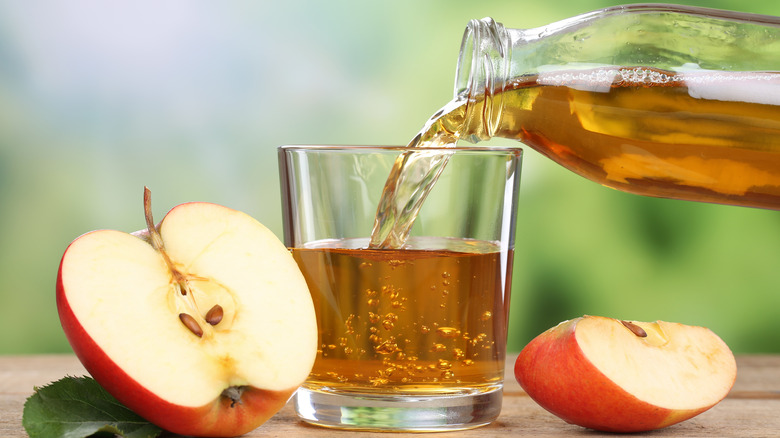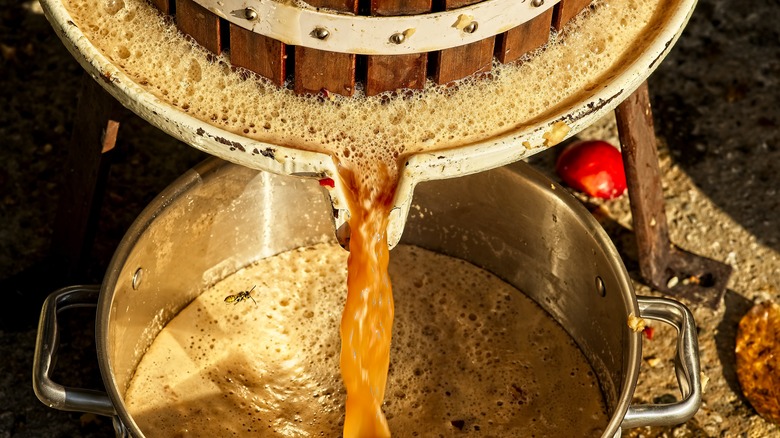The Nostalgic Fruit Juice That's Unexpectedly Hydrating
As a kid, apple juice was treat time — but little did you know that the adult in your life likely had hydration in mind when sliding the small juice-laden boxes into your backpack or lunch box.
Apple juice consists of 88% water while still tasting deliciously flavorful. Since apple juice is one of the most common and accessible fruit juices in many countries, that makes it a prized resource for preventing dehydration, regardless of how old you are. Water is essential for all kinds of body functions, from lubricating joints to regulating body temperature and mood swings, guarding the spinal cord, and helping organs such as kidneys, liver, and intestines to do their thing, explains Mayo Clinic. It also transports oxygen and essential nutrients to body cells — and the list goes on and on.
But it's not just the water content. Apple juice itself contains a lot of things that water doesn't, making it a high roller in the game of delicious liquid hydration.
Diluted apple juice for dehydration
Health experts and nutritionists almost universally recommend drinking plain-ole water, but let's face it: Not everyone, including and especially a young child, is going to guzzle a bottle of water as enthusiastically as they would a few ounces of nature's sweet, crisp, and refreshing apple juice. And Healthline points out the beneficial plant compounds tucked into that juice, which can prevent oxidative damage to the blood cells, lessening the risk of heart issues and some cancers.
That's a good bit of responsibility for a perky, nostalgic juice drink, but it's been rising to the occasion for hundreds of years. Still, there are a few things to keep in mind, including the strength that little (or big) tummies can actually handle. Infants under one year of age should not consume apple juice, and all ages, including adults drinking it for hydration, need to dilute it in a ratio of 50% water and 50% juice. That's because undiluted apple juice contains a lot of sugars, which can channel an overabundance of water into the gastrointestinal tract, leading to diarrhea, especially in infants and young children.
For normal hydrating needs, apple juice is a viable, tasty, affordable, and nostalgic option. However, anyone who's actually dehydrated, particularly to a severe degree, would be better served by medicinal electrolyte-laden liquids. In the very least, commercially available sports drinks will provide the restorative potassium you need, along with the sodium your body requires after illness.
Making your own hydrating apple juice concoction
All apple juices are not equal, especially packaged commercial brands with added sugars, preservatives, and other ingredients. Purity reigns when it comes to hydration and taste, providing a real incentive for making your own apple juice at home. Apple harvesting season generally runs from late August through October, depending on the region and specific apple variety. This gives plenty of time for plucking apples from your own trees or picking up bucketfuls from local orchards.
Make a party of the process with friends, family, or neighbors, using an apple press to extract the freshest apple juice you've ever tasted. A press isn't the only way to go –– it's entirely possible to use a fresh apple juice recipe for stovetop boiling with simple water and apples or whizz them up in a blender. If desired, jazz it up a bit with cinnamon or other earthy spices. You can also create your own version of a sports drink by mixing one part apple juice with two parts water, and adding a sprinkle of salt.
Keep in mind that any fresh juice, including apple juice, has a short lifespan. You'll need to keep it refrigerated and consume within a week, tops. If you've cold-pressed the juice without boiling water, consume within three days, or freeze it for up to a year. Your future hydration needs will be eternally grateful.



